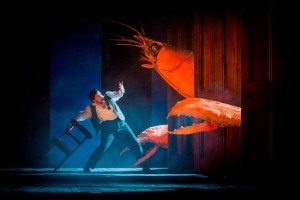Bright bowler hats, magical instruments and a gigantic, temperamental lobster abound this exuberant production of Mozart’s wonderfully silly Singspiel, ‘The Magic Flute’. Directed by former Royal Court director Dominic Cooke and revived by Caroline Chaney, the obsolete Masonic references found in the original opera are cleverly updated to Surrealist imagery. The iconography of Magritte, Dalí and Ernst – the fluffy clouds; the endless doorways; the flying fishbone bicycle – are all strikingly integrated into Julian Crouch’s inventive set and Kevin Pollard’s dazzling costumes. The result is as beautifully bonkers as the artwork it imitates.
Considering opera is held in such esteemed academic regard, the plot to ‘The Magic Flute’is really quite silly, but according to aficionados, steeped in Masonic metaphor. A tenor prince Tamino passes out while attempting to escape the clutch of a huge monster – in this case, a talented lobster. Three ladies, servants to the tyrannical Queen of the Night, succeed in killing the monster and send Tamino and his feathered friend Papageno (a baritone bird-catcher) on a quest for the Queen’s daughter Pamina, armed only with the eponymous magic flute and some magic bells. After much bawdy farce and wars between good and evil, an inevitably happy ending allows Papageno to find his Papagena, Tam gets his Pam and all the characters rejoice at making it through the plot alive.
It sounds ludicrously like glorified pantomime but the glorious array of exceptional voices make up for what ‘The Magic Flute’ lacks in profundity. Although the acting generally is a little overdone, and aptly so, Benjamin Hulett and Elizabeth Watts make amiable romantic leads, their voices soaring and suited together. Samantha Hay, despite just recovering from a cold, provides vocal pyrotechnics as Queen of the Night, adding depth to the usually two-dimensional villain. Daniel Grice and Claire Hampton as Papageno and Papagena are the real show-stealers though with their hilarious performance of the ‘Pa Pa Pa’ duet. Great performances are also given by the three ladies (Camilla Roberts, Máire Flavin, Emma Carrington), Scott Wilde as a booming Sarastro and Howard Kirk as a delightfully evil Monostatos. One must not forget either the enrapturing chorus who become a surprise star of the evening, courtesy of Chorus Master Alexander Martin. It is no wonder they are in such demand.
This version of ‘The Magic Flute’ was initially criticised when it first appeared in 2005 and wrongly so. Modernisations of famous operas are often dismissed as undermining the score but, in my opinion, they do the complete opposite. Operas require innovative modernisations and re-interpretations in order to enhance their relevance to today’s audience. It keeps opera alive. While the plot has faded, the music certainly has not. Played by a flawless orchestra conducted exceptionally by Simon Phillippo, Amadeus certainly rocked me.
Wales Millennium Centre again on 30thMay and 5th June 2015.

